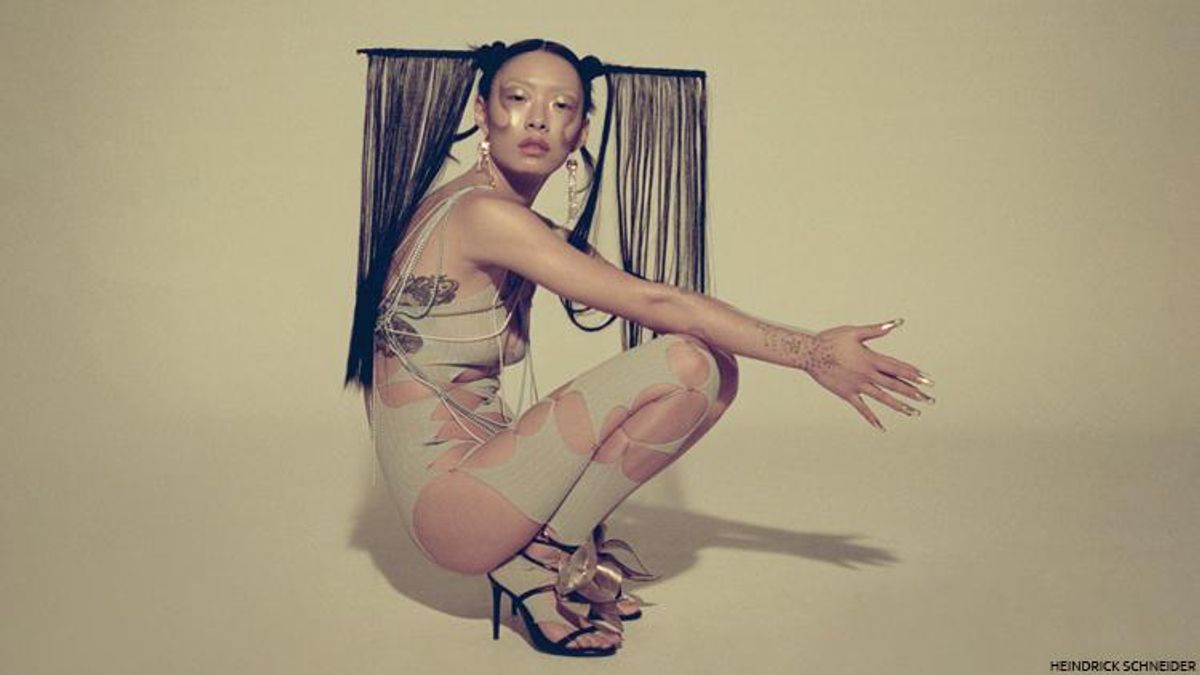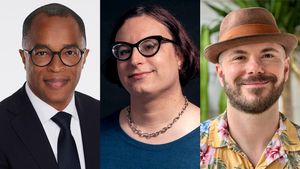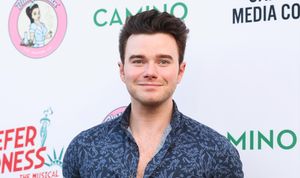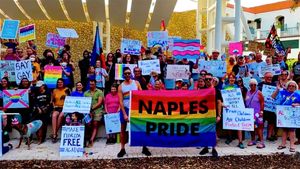Many pop stars who are signed to a label in their early teens find it hard to discover their authentic voice from the get go. In a way, it's its own skill to weave one's truth inside their music and sound. At 29-years-old, Rina Sawayama, the Japanese London-based singer-songwriter, fashionista, and rulebreaker, has already done that work. Having dropped her debut album SAWAYAMA to critical acclaim -- Sir Elton John even named the sleek, pop album one of his favorite records of the year -- Sawayama is cultivating an international family of fans, with her art at the center.
Sawayama would argue that queer people are especially drawn to her music because it's "authentic and very honest."
One listen to SAWAYAMA, which is one of the top-rated albums on Metacritic, and you can tell she's a pop obsessive. The album is an eclectic mishmash of bops, citing everything from early 2000s pop, '80s rock ballads, and Carly Rae Jepsen. Between the nod to Beyonce singing along to the "I Care" guitar riff in "Dynasty," the Janet Jackson vibes in "Love Me 4 Me," and the playful power ballad kiss-off that is "Who's Gonna Save You Now" that harkens back to Gaga's heyday, it's clear that she loves "cheesy pop" as much as we do. But another thing is certain: We've never seen anything like her.
"Rina's '90s/'00s shimmery R&B pop makes me weirdly nostalgic for a moment in culture that didn't even include anyone like me," says David, an Asian-American self-professed stan living in Los Angeles. "In a way, her music retroacts an unapologetically Asian voice into that cultural mix, extending the borders of the pop fantasy to a whole new diaspora."
RuPaul's Drag Race star Soju agrees: "To see a queer Asian singer making her own space in white-dominated world was inspiring, I had to stan," she says. "This isn't something you can hear in Asia or Western countries. This is a sound that can only be created from an Asian artist that experienced both cultures."
The performer signed her first record deal last year. Before that she had working-class jobs administering loans for start-up companies, working as a nail technician, and even in an ice cream van. Sawayama believes she had to work those jobs to crystallize her art.
"Your creativity needs to be protected at all costs," she says. "Creativity is your inner child you need to protect. You can't ask a child to earn money for you." When she first began to upload songs to SoundCloud, she "was working in the ice cream truck and I got recognized, I'd be doing someone's toenails and they'd recognize me."
That feels a world away now. SAWAYAMA bridges those gaps between her identity, an examination of what it means to belong, breaking stereotypes, and finding acceptance within yourself. "Chosen Family" was the last song she wrote for the record, and perhaps the most meaningful for LGBTQ+ listeners.
"I wanted to write a love song for my best friends," she says of its inception. "The struggle of not being accepted by family because of who you are and all the homophobia and shit that comes with it, I know it and I see it and it really deeply affects my friends. That sort of just came from a very pure place."
The ballad begins with a spoken question: "Where do I belong?" She sings tenderly over sparse synths, a stark tone-shift from the rest of the album. "So what if we don't look the same?/We been going through the same thing/You are, you are/ My chosen, chosen family."
It's like she's singing directly to the listener, an almost motherly hug through a hymn. "I almost cried when I heard 'Chosen Family,' wrote one listener on YouTube. "Knowing she's pansexual herself, it felt like a love letter to the LGBTQ+ community and it made me feel so good and loved."
Chosen family is a concept LGBTQ+ folks are familiar with. We all seek comfort in those who can understand what we've been through, who know and sympathize with what it's like to live in a homophobic or transphobic world. For those of us who weren't accepted by our blood relatives, the family we create for ourselves is even more precious.
It took years for Sawayama to find her people. She recalls her first time truly feeling othered, when she left home and went to university at Cambridge. She had major imposter syndrome and witnessed many slights against the prestigious school's small population of POC.
"I remember the university wanting to check my visa every year, which is crazy because it's an indefinite visa and I applied as a UK student, but they wanted to check it every year," she says. Her name would also randomly pop up on international students' registry, "which...I'm not an international student." This extends to today: though she considers herself British as she's lived in the country since she was a toddler, Sawayama's indefinite leave to remain visa makes her ineligible to enter major British music awards like the Mercury Prize and the BRITs as a British artist.
After university, Sawayama says she suffered through severe mental health issues, but she began to make friends who were Asian. It allowed her to unpack her identity as a Japanese-British woman. "I used to hate my family, blame my mom, be embarrassed and stuff, but ever since I met them and I was like, 'Oh wow, your mom's like that too.' That's when I came into my own. And I think a lot of queer people and people of color feel like that."
Writing "Chosen Family" was part of that healing process for Sawayama. "Rewriting the pain is so important. I think accepting that pain as your own is very important, but you can't do it just as it is. You have to re-contextualize it into humor," she says. "That's sort of how me and my friends dealt with it."
What she once didn't like about herself, she was suddenly able to wear it as a badge of honor, wielding it like a sword. "The humor that we have about my culture and just being queer in general is probably one of our biggest weapons. You want to slash out slurs at us, that's what we call each other every day. It doesn't hurt me anymore."
After all, sometimes "you need to find a community that you can safely joke about your traumas."

























































































Cooper Koch and twin bro spark controversy with eye-popping 'White Lotus' parody